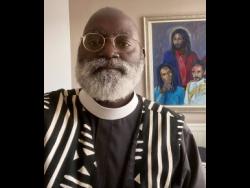
A Jamaican pastor, the Rev Dr Mark Bozzuti-Jones, is being hailed for his conscious reggae talk from the pulpit as he delivered a sermon to the faithful about the positive effects of the music created in the land of his birth. The priest at Trinity Wall Street parish in New York City, where he is the director of core values and also the director of Latin American and Caribbean relations, served up some listen-to- reggaemusic-and-chill, quarantine advice.
“I am not sure if you are aware of this, but it is written, and if it is not written, then it should be written, that the best music during the time of quarantine is reggae music. So you should be listening to reggae music at home. I want to invite you to listen to two of my favourite pieces of music,” the Episcopal priest said while addressing his congregation virtually.
One of the pieces was Redemption Song, the final track on Bob Marley and the Wailers’ 1980 Uprising project, the last album released by the reggae icon during his lifetime. The priest soberly quoted some of the lyrics of Redemption Song: “How long shall they kill our prophets while we stand aside and look, some say it’s just a part of it we’ve got to fulfil the books.”
His other favourite turned out to be Creation by Peter Tosh, which appears on Tosh’s acclaimed Bush Doctor album (1978). He quoted some of the lyrics of this “powerful ballad, which echoes the words of the Psalmist”.
The clip was shared by Peter Tosh’s Instagram page and went viral, with the feedback being overwhelmingly positive not only from the music industry. In fact, another priest, Fr Sean Major Campbell expressed his delight. “His sharing affirms the value of our local prophets who spoke much wisdom. Sadly, on the local scene, we encounter a number of weirdos self-declaring a revered status of prophet. Fr Mark keeps in line with the prophetic tradition as he consistently speaks for the poor and the oppressed. He also stands with the reggae prophets, who continue to speak truth to power,” he said.
When contacted, Fr Mark told The Sunday Gleaner that he had been wondering why he had been receiving so many calls about that particular sermon. “Now I know,” he said, after hearing about the Tosh IG link. The good reverend, who wasn’t even concerned about defending what some may consider an unorthodox sermon, noted that there is music and then there is reggae music. “There’s no denying that not all music is created equally. We can listen to reggae music and learn from it. Be uplifted. The sermon was really about the stoning of Stephen, and then came the news about the killing of the young man, Ahmaud Arbery. And Rastafarians suffered this same kind of fate. How long shall we kill our prophets?” he quizzed. In his sermon, he asked the very same question.
But for the Rev Dr Mark Bozzuti-Jones, the quarantine and chill experience is a bit more than enlightening his congregation about the power of two reggae classics and getting letters to say that some who had not listened to reggae music before were now doing so. Again reflecting on Tosh’s Creation, he stated, “Jah is my keeper. These words have tremendous import. It shows confidence in God as our keeper and our protector. We need not be afraid.”
The patriotic Jamaican urged his fellow citizens to use this time of quarantine to “deepen our consciousness”. He added: “I am sending a shout-out to all the producers of music that this is a wake-up call to sing the Lord’s song in a strange land and in a strange time. This is a new consciousness and a new proclamation of what reggae music can be and ought to be.”
Born in Kingston, the Rev Dr Bozzuti-Jones studied philosophy at Loyola University in Chicago prior to receiving his Master of Divinity degree from the Jesuit School of Theology in Berkeley, California. He also attained a Master of Arts in creative writing from the University of San Francisco. He started his career as a Jesuit missionary serving in Belize, Brazil, Guyana, and Mexico and then joined the Anglican community. He has authored several books, including two on African-American spirituals and another titled The Rastafari Book of Common Prayer.
He received the Alexander Hamilton Immigrant Achievement Award in 2018.